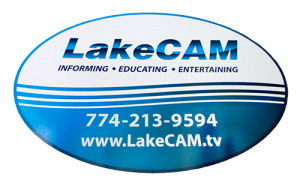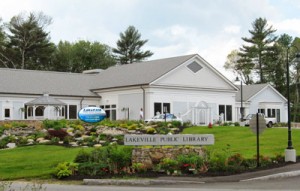
LakeCAM Mission Statement
LakeCAM was established to provide quality local programming for the residents of Lakeville, Massachusetts, including coverage of municipal meetings, community events and other noncommercial programs of local interest or importance.
Lakeville Community Access Media is a not-for-profit corporation, independent of Lakeville town government. LakeCAM is organized and managed by a Board of Directors consisting of Lakeville residents, who are unpaid volunteers.
 The LakeCAM studio and cablecast facility is housed in the beautiful Lakeville Public Library.
The LakeCAM studio and cablecast facility is housed in the beautiful Lakeville Public Library.
LakeCAM provides PEG community access programming (Public, Educational, and Governmental).
LakeCAM is funded by Lakeville suscribers of Comcast and Verizon cable television services.
The History of LakeCAM
LakeCAM’s story begins with Lakeville’s cable TV story. In 1984, Lakeville’s Board of Selectmen received notice that Continental Cablevision of Boston wanted to bring cable television to Lakeville. By law, every city and town must grant a license to provide cable TV service if a provider requests a license. With that letter, Continental had asked for a license. But also by law, cities and towns are allowed to negotiate the details of the license. Important details include the license duration (up to 15 years for an initial license and up to 10 years for renewal licenses), the amount of money refunded by the provider to the city or town, and a studio for the benefit of the community.
To meet the Massachusetts state licensing requirements, the Lakeville Board of Selectmen, the “Issuing Authority” in the world of cable TV (because they have the authority to issue the license), in 1984 formed a Cable Advisory Committee (CAC) of five Lakeville volunteers. The CAC met with Continental’s representatives and forged a license agreement that provided Lakeville with cable TV service out of a head-end building located in Middleboro. The head-end houses all the electronic equipment necessary to receive programming from satellite and other sources and to redistribute that video programming over the cables attached to subscribers’ homes.
Continental’s Middleboro building also housed a customer service office and a studio, which was shared with Middleboro’s cable TV service based approximately on the proportional number of subscribers in each town.
Over time, Continental Cablevision was absorbed by US West Communications, which renamed Continental Cablevision as MediaOne. MediaOne was purchased by AT&T, and AT&T™s cable business was later purchased by Comcast. During those years, Lakeville’s CAC successfully negotiated renewal contracts with the various cable owners, always managing to win a commitment to receive payment and studio support. That’s why, for example, various meetings and activities in Town were formerly recorded by Comcast employees.
Lakeville used a small part of the retained money to build a small studio at Apponequet High School. For a number of years, this studio supported TV journalism courses that successfully graduated students into related careers. Today, we still have a cable going from the High School studio to Comcast’s Middleboro facility, so live programming from the school directly to subscribers’ homes may be technically possible. While Lakeville shouldered the lion’s share of the funding, for that project, Lakeville partnered with Freetown to build the studio, because Freetown students could take the TV journalism course and Freetown families could enjoy watching their children in school activities.
In recent years, however, Comcast began backing out of the studio business nationally and pushing that task back onto the shoulders of the communities. Middleboro, for example, chose to establish their own studio in their town hall because it had the space. Middleboro’s cable studio is a town department and their studio employees are town employees. Lakeville decided on the more common approach of establishing a separate non-profit corporation (a so-called “501c3”) that receives cable TV subscriber funding (collected by Comcast and Verizon as a percentage of subscribers’ monthly bills). In September 2012, Lakeville’s studio in the library “went live.” Today, programming originates from LakeCAM’s studio office in the Library, is sent by optical fiber to Comcast and Verizon, and is then redistributed by them to Lakeville subscribers.
In February of 2012 the Board of Selectmen agreed that Lakeville’s subscribers would be best served by a private non-profit organization rather than a new Town department. Fortunately, the CAC had saved a significant portion of the monies paid by the cable providers specifically to fund an independent Lakeville studio.
The questions were: How would it start, where would it start, and by whom would it be run?
Three then-members of the CAC volunteered to resign from the CAC and become founding members of the new Board of Directors of the as yet unnamed corporation; two had been members of the CAC since the very beginning (Bob Marshall and Don Foster). Much groundwork and organizing was needed to meet a very aggressive schedule, since Comcast had committed to “pulling the plug” of its Middleboro studio in September of 2012. Legal work established the corporate entity, which was necessary in order to transfer money.
Many potential locations around Lakeville were considered for the new studio. An important criterion was proximity to existing Comcast and Verizon fiber optic lines in order to minimize the added cost of running new ones, and this requirement disqualified several attractive locations. Finally, an agreement between the Lakeville Public Library Board of Trustees and the new LakeCAM Board (by then we had adopted the name “LakeCAM”) resulted in a small leased space inside the Library.
The Lakeville Library has proven to be a good location. The space is modern and many interesting events occur at the Library, most of them recorded on location by LakeCAM and cablecast to subscribers. LakeCAM helps defray certain costs that the Library would otherwise fully shoulder, and makes rent payments to the Town of Lakeville. Finally, this location allows LakeCAM and the Library to collaborate on projects to bring more “library awareness” to Lakeville residents. Without question, the Lakeville Library and LakeCAM share a common and synergistic vision.
At this time, LakeCAM is run by an Executive Director, and staffed by a Program Manager, and a number of stipend volunteers. More volunteers and community producers are need to help fill our on-air schedule.
LakeCAM always welcomes inquiries from residents/subscribers who may be interested in “hands on” experience in the TV business.
